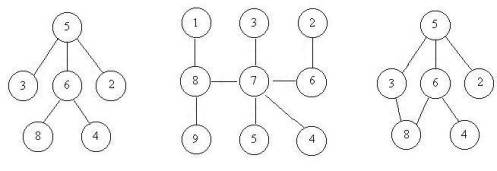题目链接:
http://acm.hdu.edu.cn/showproblem.php?pid=1272
题目大意:
Problem Description
上次Gardon的迷宫城堡小希玩了很久(见Problem B),现在她也想设计一个迷宫让Gardon来走。但是她设计迷宫的思路不一样,首先她认为所有的通道都应该是双向连通的,就是说如果有一个通道连通了房间A和B,那么既可以通过它从房间A走到房间B,也可以通过它从房间B走到房间A,为了提高难度,小希希望任意两个房间有且仅有一条路径可以相通(除非走了回头路)。小希现在把她的设计图给你,让你帮忙判断她的设计图是否符合她的设计思路。比如下面的例子,前两个是符合条件的,但是最后一个却有两种方法从5到达8。


Input
输入包含多组数据,每组数据是一个以0 0结尾的整数对列表,表示了一条通道连接的两个房间的编号。房间的编号至少为1,且不超过100000。每两组数据之间有一个空行。
整个文件以两个-1结尾。
整个文件以两个-1结尾。
Output
对于输入的每一组数据,输出仅包括一行。如果该迷宫符合小希的思路,那么输出"Yes",否则输出"No"。
Sample Input
6 8 5 3 5 2 6 4
5 6 0 0
8 1 7 3 6 2 8 9 7 5
7 4 7 8 7 6 0 0
3 8 6 8 6 4
5 3 5 6 5 2 0 0
-1 -1
Sample Output
Yes
Yes
No
解题思路:
其实就是判断无向图是不是树。
可以用dfs判断连通性,只要所有点连通并且点数=边数+1,就满足条件
或者用并查集判断有没有环,只要无环并且点数=边数+1,也满足条件
注意:只输入0 0也满足条件,为空树
DFS版:
1 #include<bits/stdc++.h> 2 using namespace std; 3 int T, n, m; 4 const int maxn = 100000 + 10; 5 vector<int>G[maxn]; 6 bool vis[maxn]; 7 void init() 8 { 9 for(int i = 0; i < maxn; i++)G[i].clear(), vis[i] = 0; 10 } 11 void dfs(int u) 12 { 13 if(vis[u])return; 14 //cout<<u<<endl; 15 vis[u] = 1; 16 for(int i = 0; i < G[u].size(); i++) 17 { 18 dfs(G[u][i]); 19 } 20 } 21 int main() 22 { 23 int x, y, c; 24 while(cin >> x >> y && (x + y >= 0)) 25 { 26 m = 1; 27 n = 0; 28 set<int>s; 29 s.insert(x); 30 s.insert(y); 31 if(x == 0 && y == 0) 32 { 33 cout<<"Yes"<<endl; 34 continue; 35 } 36 init(); 37 G[x].push_back(y); 38 G[y].push_back(x); 39 while(cin >> x >> y && (x + y)) 40 { 41 s.insert(x); 42 s.insert(y); 43 G[x].push_back(y); 44 G[y].push_back(x); 45 m++; 46 c = x; 47 } 48 dfs(c); 49 for(set<int>::iterator it = s.begin(); it != s.end(); ++it) 50 { 51 if(vis[*it])n++; 52 } 53 if(n == m + 1)cout<<"Yes"<<endl; 54 else cout<<"No"<<endl; 55 } 56 return 0; 57 }
并查集版:
1 #include<bits/stdc++.h> 2 using namespace std; 3 int T, n, m; 4 const int maxn = 100000 + 10; 5 int cases; 6 int p[maxn]; 7 void init() 8 { 9 for(int i = 0; i < maxn; i++)p[i] = i; 10 } 11 int Find(int x) 12 { 13 return x == p[x] ? x : p[x] = Find(p[x]); 14 } 15 int main() 16 { 17 int x, y, c; 18 while(cin >> x >> y && (x + y >= 0)) 19 { 20 m = 1; 21 n = 0; 22 set<int>s; 23 s.insert(x); 24 s.insert(y); 25 if(x == 0 && y == 0) 26 { 27 cout<<"Yes"<<endl; 28 continue; 29 } 30 init(); 31 int flag = 1; 32 p[y] = x; 33 if(x == y)flag = 0; 34 while(cin >> x >> y && (x + y)) 35 { 36 s.insert(x); 37 s.insert(y); 38 m++; 39 if(Find(x) == Find(y))//判断是否存在环 40 { 41 flag = 0; 42 } 43 p[y] = Find(x); 44 } 45 if(s.size() == m + 1 && flag)cout<<"Yes"<<endl; 46 else cout<<"No"<<endl; 47 } 48 return 0; 49 }